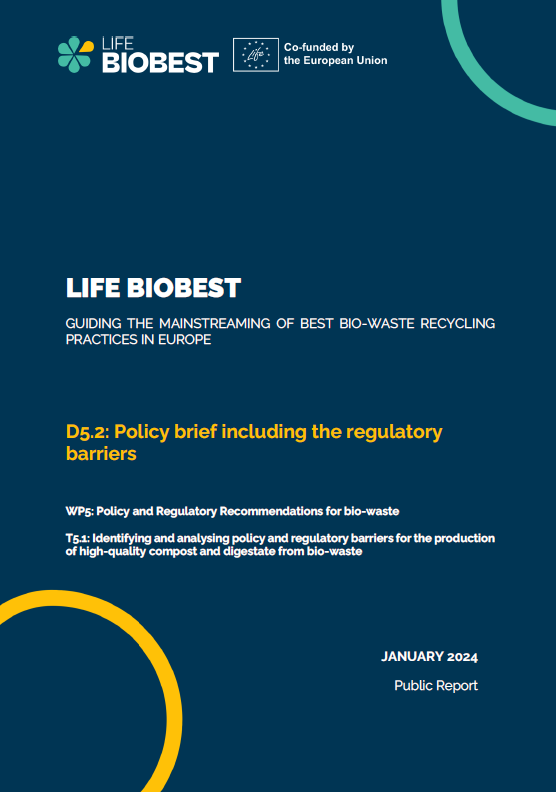
Ahead of the EU bio-waste separate collection mandate in January 2024, LIFE BIOBEST‘s Deliverable 5.2 identifies the gaps in the regulatory framework and systemic barriers obstructing efficient bio-waste management with high capture rates of high-quality material.
LIFE BIOBEST interviewed 15+ expert stakeholders from across the EU to discuss the difficulties of meeting the landfill and recycling targets as well as the mandate for separate collection of bio-waste. This report investigates the status of transposition and management results of the EU legal framework and proposes recommendations and calls to action.
Available in English.
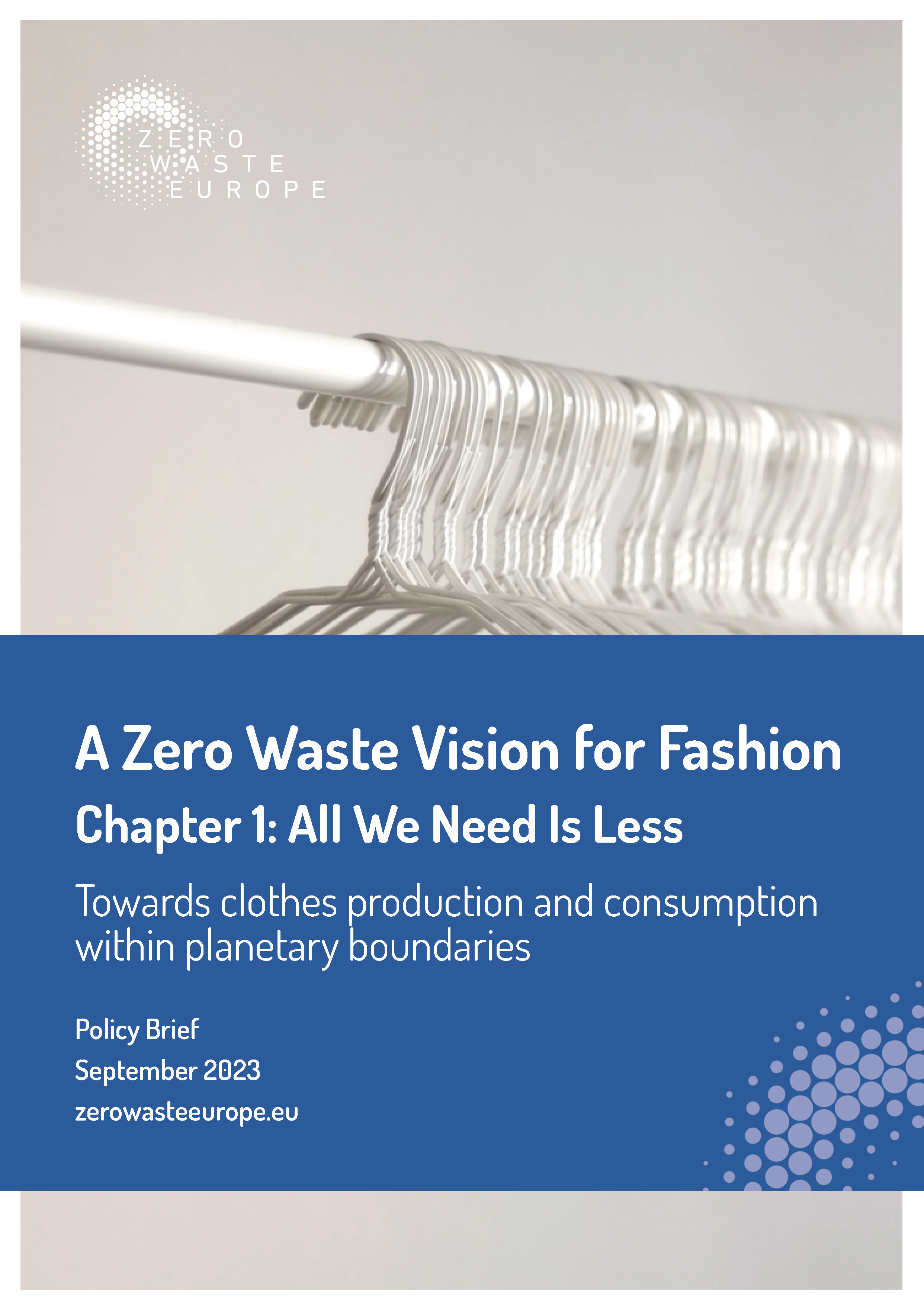
Without a shift to sufficiency in the fashion sector, the industry is on track to exceed planetary boundaries.
In this paper, ZWE outlines a list of entry points for the transition towards sufficiency and urges governments to take proactive steps to adopt best practices. More precisely, the paper suggests a legal framework banning the destruction of unsold goods, setting a target for textile waste reduction and resource use and transforming EU waste legislation into a ‘Resource Framework Directive’ in line with a 1.5-degree target.
The paper underlines that governments should not rely on so-called consumer behaviour ‘nudges’ to cut down on fashion consumption and must address the cause of the current waste crisis: the fast fashion business model that relies on selling large volumes of trendy items. The textile sector’s transformation is a critical milestone, yet it’s only part of a broader economic shift toward sufficiency, well-being, and resilience within planetary boundaries.
This paper serves as the inaugural chapter in a two-part series exploring fashion and textiles along the entire value chain. The subsequent chapter will delve into circularity, covering optimal design, use, reuse, recycling, and end-of-life treatment of garments.
Executive Summary available in English, Italian, and Croatian.
Full paper available in English.
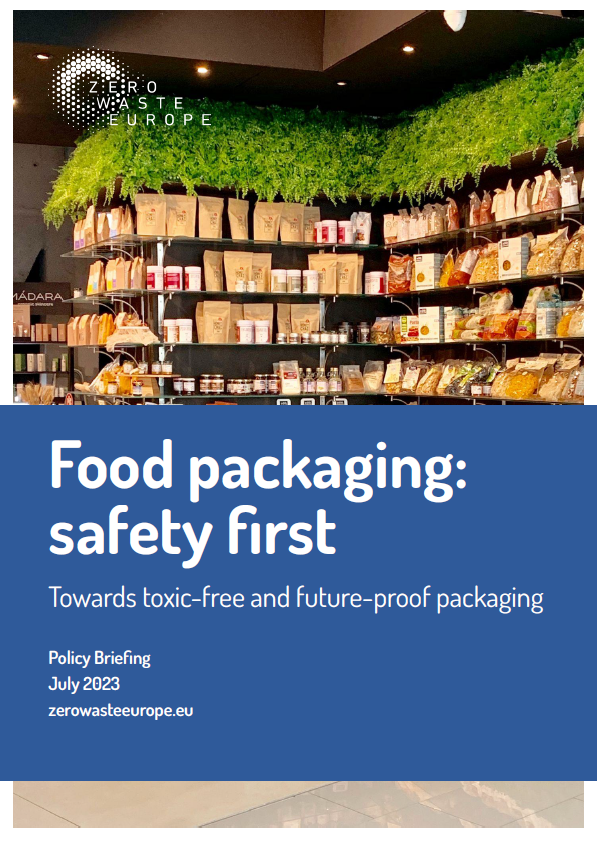
Despite increased attention being paid to the sustainability and principles of circular economy in the European Union, there is a general lack of holistic and harmonised legislative approaches towards materials’ circularity and the critical aspects of their chemical safety. A more coherent EU policy on consumer safety issues is not only highly desirable, but human biomonitoring data on harmful chemicals detected in the entire EU population show that it is urgently needed.
This ZWE policy briefing lays out proof and tried-and-test arguments towards toxic-free and future-proof packaging.
Executive Summary available in English and French.
Full briefing available in English.
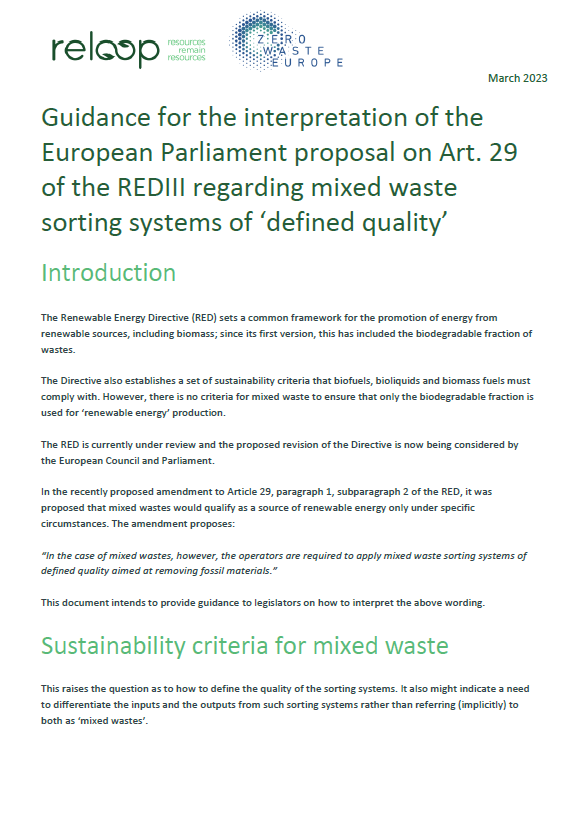
This policy briefing by Reloop and Zero Waste Europe provides guidelines for legislating mixed waste sorting (MWS) in the context of the Renewable Energy Directive (RED). The guidelines were developed to clarify the amendment proposed by the European Parliament regarding the use of mixed wastes for ‘renewable energy’ purposes. The document recommends applying MWS systems of defined quality to remove fossil-derived materials to ensure that only biogenic waste is used for renewable energy generation. Following the requirement, the operators would either need to pre-sort the waste on-site or demonstrate that all waste received has undergone sorting prior to it being delivered for incineration.
Available in English.
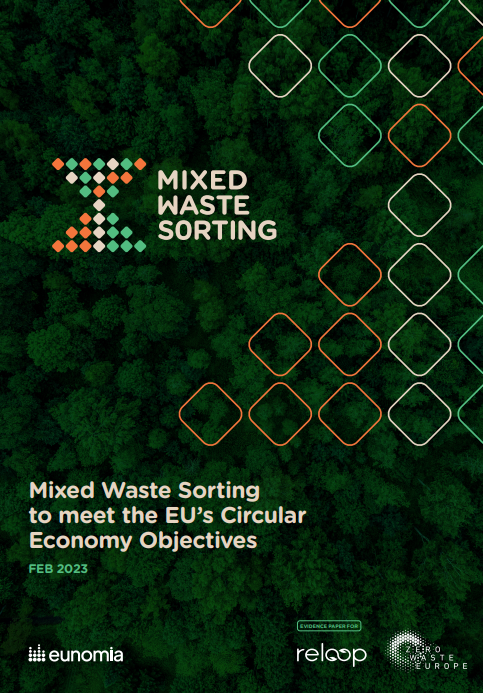
This report and policy briefing studied whether, and to what extent, the EU recycling targets can be met through improved recyclability of packaging and increased separate collections of municipal waste—and, if not, what measures could be taken to achieve them.
It has examined the role mixed waste sorting (MWS) could play in three EU countries with high recycling performance – Germany, Belgium, and Sweden. The conclusion was concluded that, in addition to separate collection and improved recyclability of plastic packaging, a full roll-out of effective MWS is necessary to ensure that recycling targets are consistently met and to ensure progress towards the EU’s wider carbon emissions reduction goals.
Available in English.
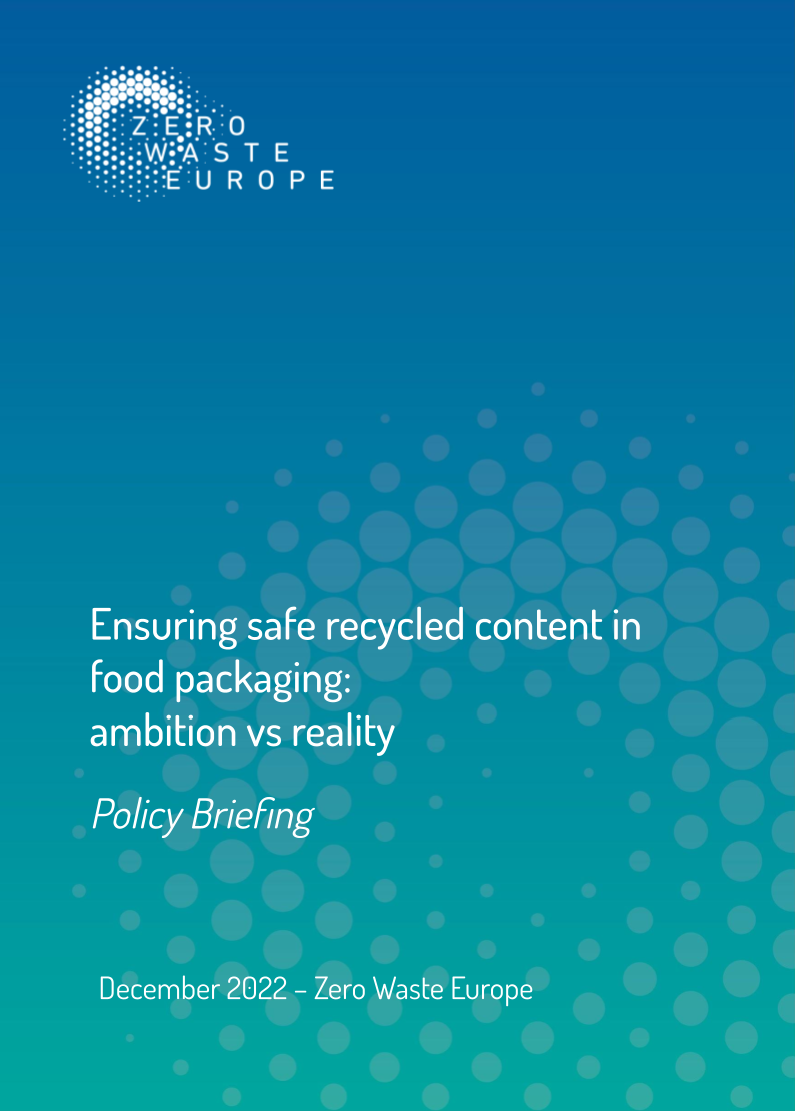
When it comes to Food Contact Materials (FCMs), the use of recycled content potentially creates new pathways through which humans can be exposed to hazardous chemicals in contaminated recycled material flows.
Today, recycling technologies have not proved to be able to remove all toxic chemicals already present in plastic in the first place and current regulations shift this responsibility away from plastic producers to recyclers, who struggle to process many unrecyclable or difficult-to-manage plastics,
Regulatory framework must be ambitious enough to urgently phase out the most hazardous chemicals to ensure food packaging and other food contact articles are truly safe for use, reuse and recycling.
The full report is available in English. The Executive Summary is available in French, Italian, Spanish, Portuguese, Dutch and German.
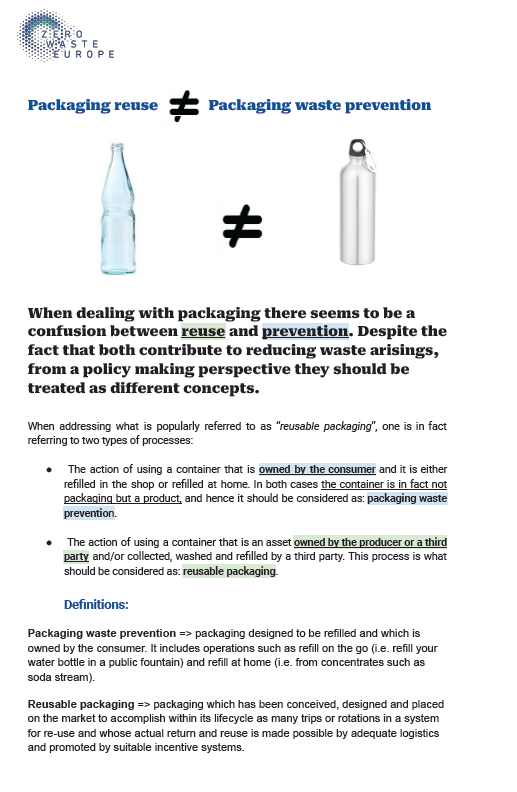
When dealing with packaging there seems to be confusion between reuse and prevention. Despite the fact that both contribute to reducing waste arisings, from a policy-making perspective they should be treated as different concepts.
Available in English.
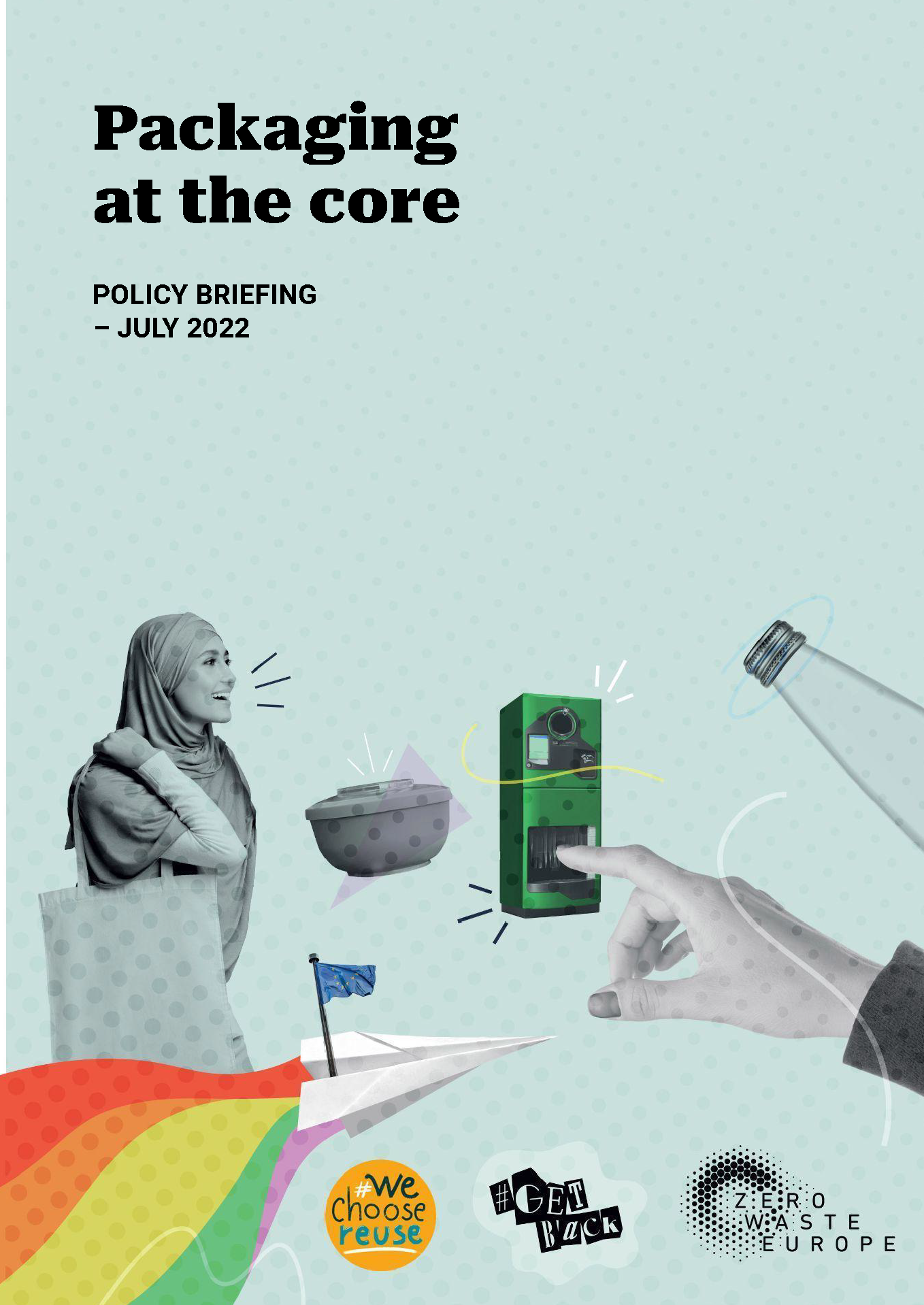
This paper compiles evidence of the boundless aspects of packaging pollution, and demonstrates how solving the packaging issue can help tackling other major world problems, such as global warming, toxicity in our food and beverages and waste trade.
Available in English.
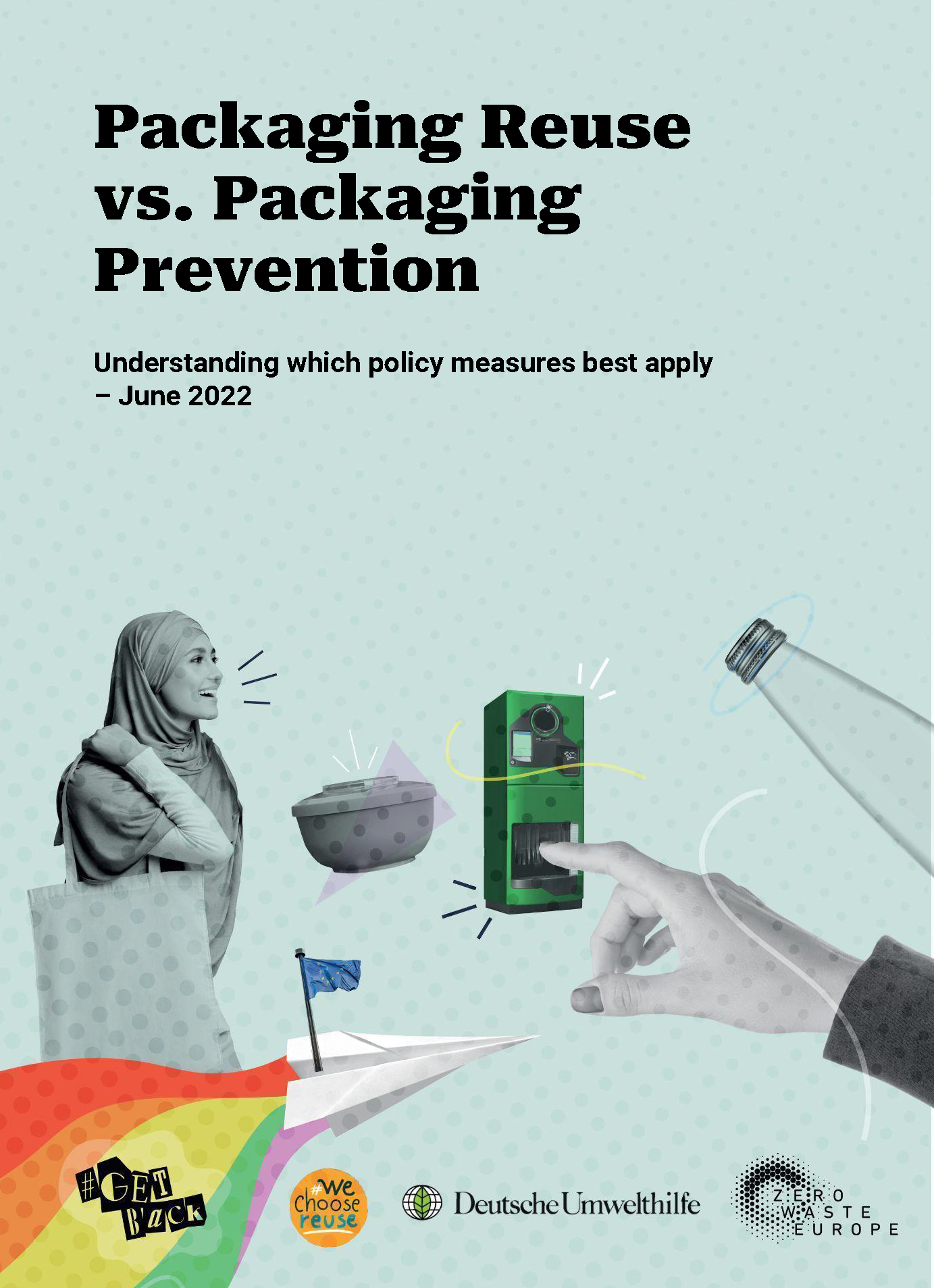
When dealing with packaging there seems to be a confusion between the actions referring to reuse and to prevention. Despite the fact that both contribute to reducing waste arisings, from a policy-making perspective, they should be treated as different concepts.
In view of the upcoming revision of the Packaging and Packaging Waste Directive (PPWD), this paper aims to clarify what should be defined as packaging reuse and what should be defined as packaging waste prevention and which are the policy measures that encompass one and the other.
Available in English.
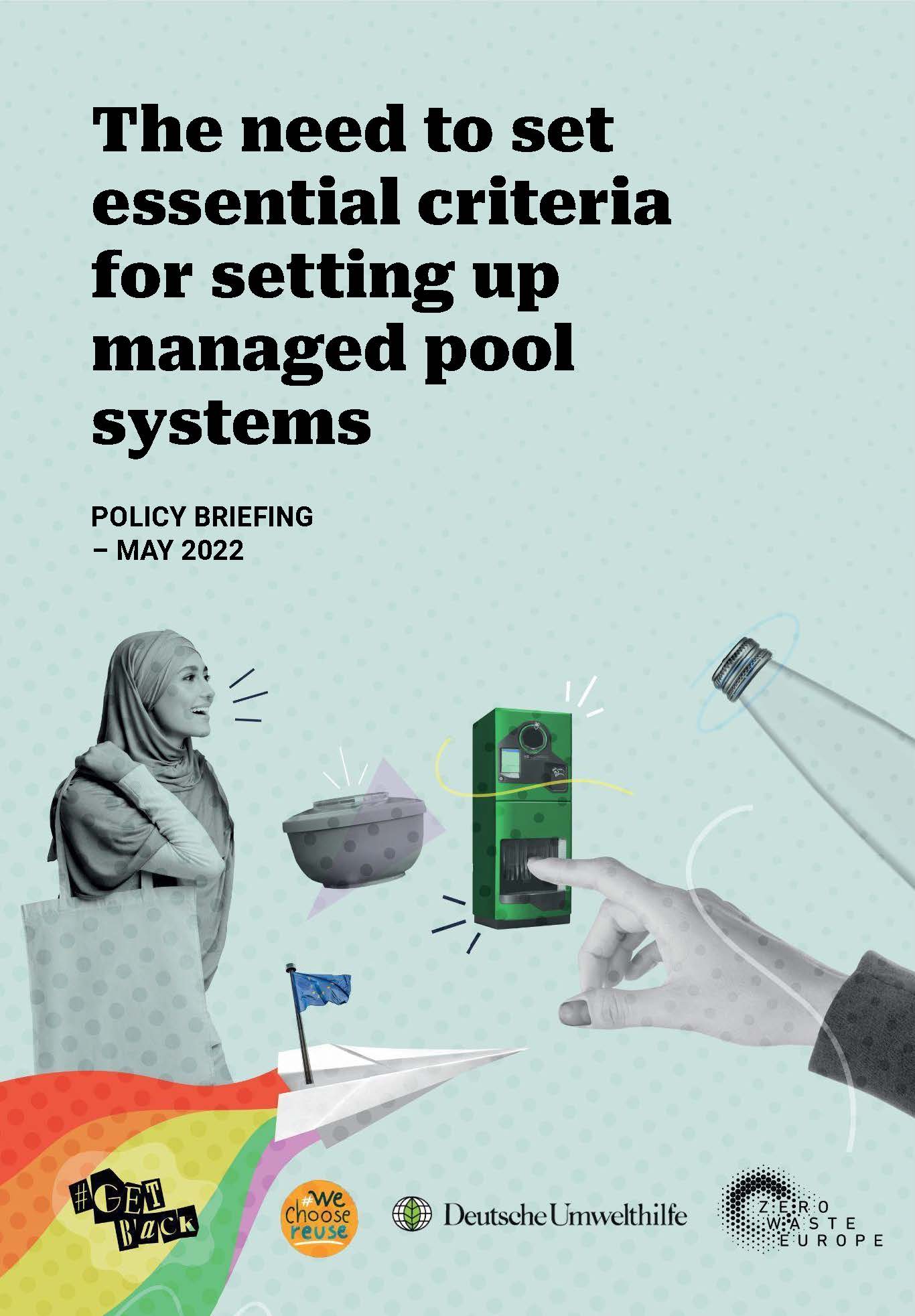
Well-managed pool systems for reusable packaging are a key instrument to make efficient and effective reuse systems work, and should be an essential accompanying tool to any reuse targets. This paper intends to provide guidance on this topic and propose policy proposals to take into account when creating EU legislation on reuse.
Available in English, German, French, Dutch and Spanish.
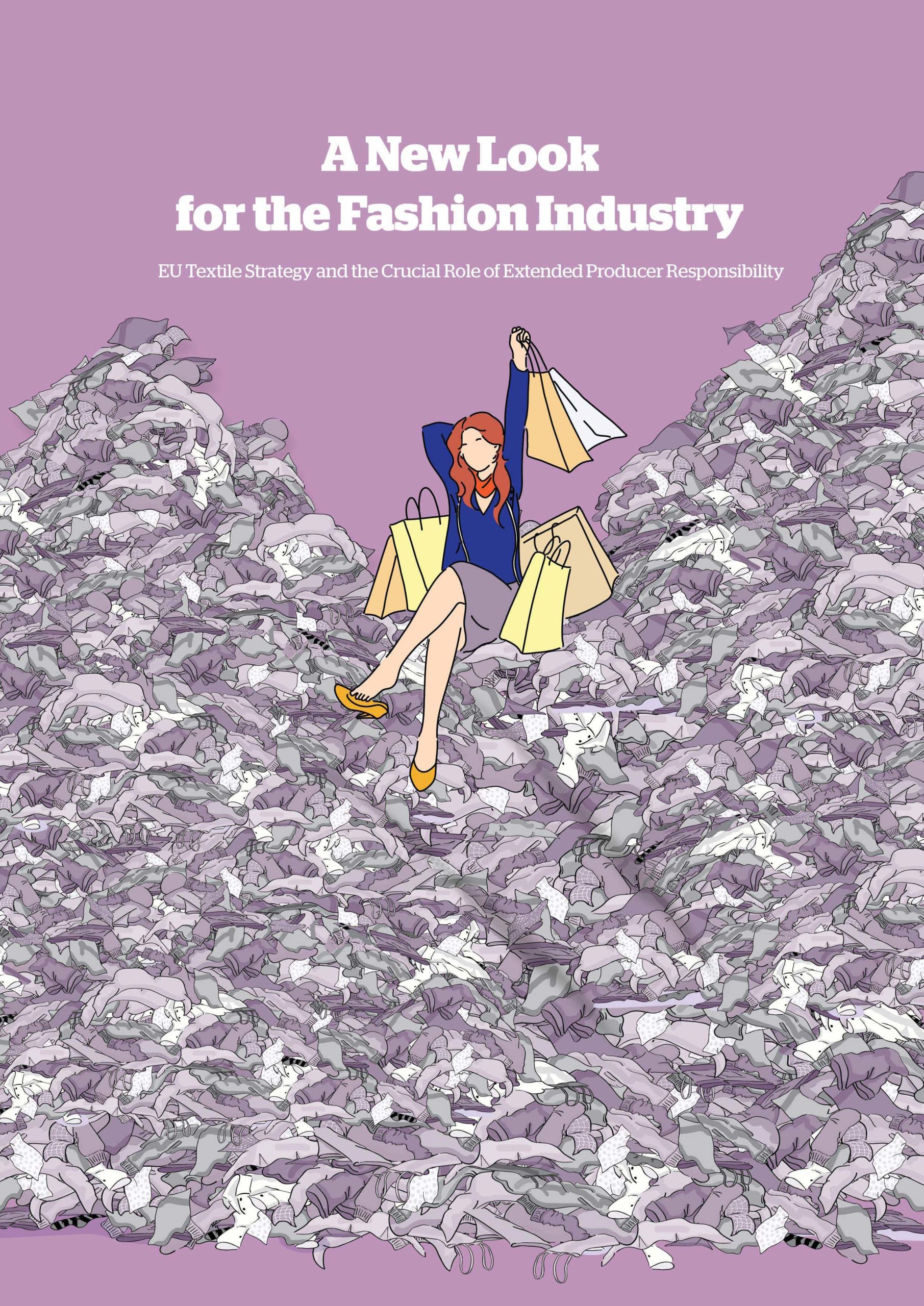
In the first half of 2022, the European Union (EU) will take the first steps in becoming a global leader in taking on an ugly problem: fast fashion and its mountains of waste.
The EU will become the first world region to target the flaws in fashion so directly, with regulations that promise to improve the circularity of textiles; stop overproduction; empower consumers to make more responsible choices; and make fashion brands accountable for their massive waste problem.
This political briefing by Changing Markets Foundation, the European Environmental Bureau, and Zero Waste Europe focuses on Extended Producer Responsibility (EPR), a powerful market-based tool that is expected to be at the centre of the European Commission’s upcoming Textiles Strategy.
Available in English.
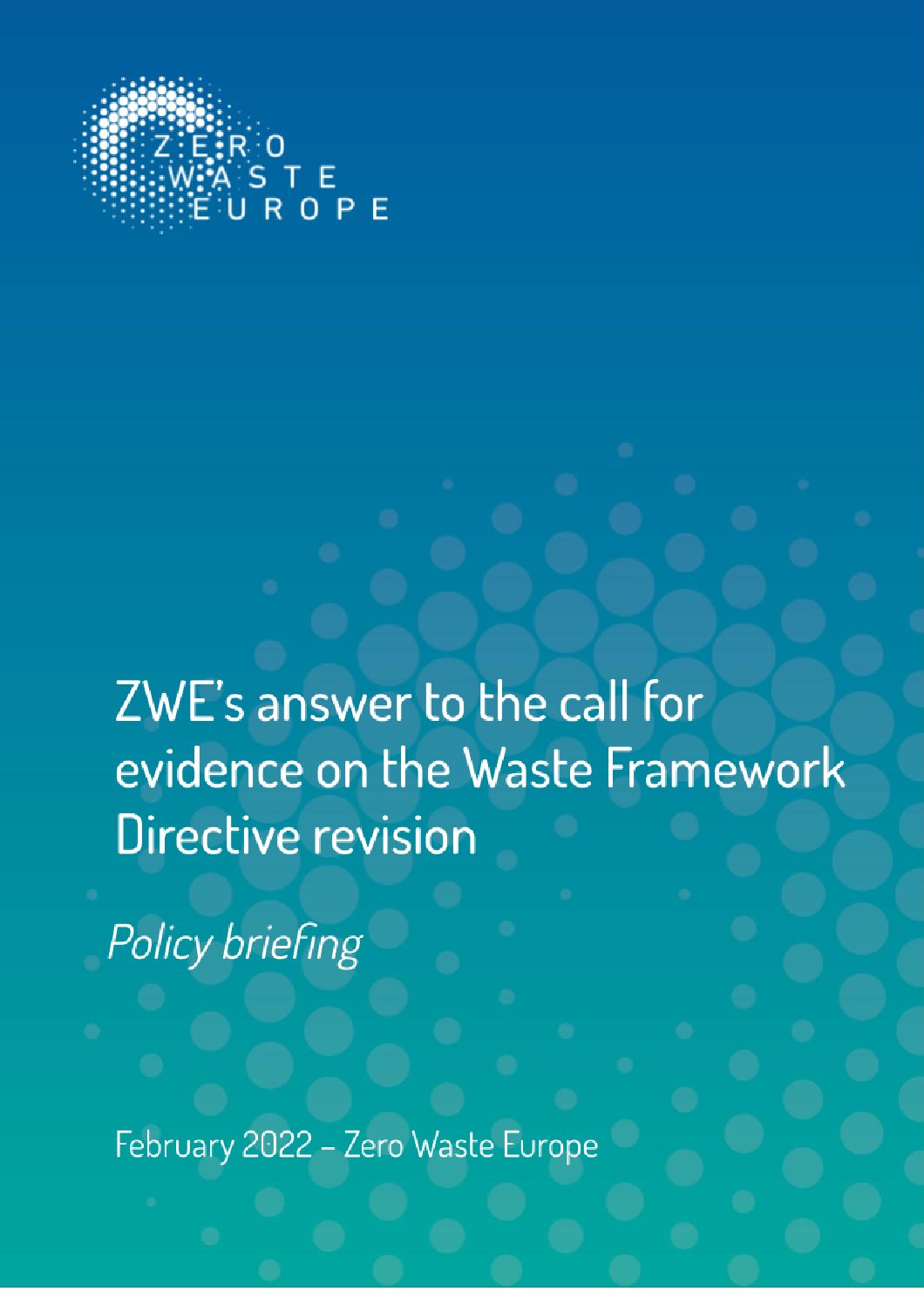
Zero Waste Europe welcomes the European Commission’s initiative to revise the Waste Framework Directive with the aim to improve the overall environmental impact of waste management in the EU. The focus on qualitatively improving the recycling system, as well as the focus on waste prevention, are of high importance as, so far, the EU efforts on the circular economy have only led to a quantitative increase in recycling. This approach has led to significant progress, but these remain insufficient with regard to the EU environmental ambitions.
Through this revision process, Zero Waste Europe hopes to see the EU complementing its existing legislation with an integrated waste prevention framework, enabling high-quality recycling and a set of concrete tools to reduce resource use and enable waste prevention on the ground.
Available in English.
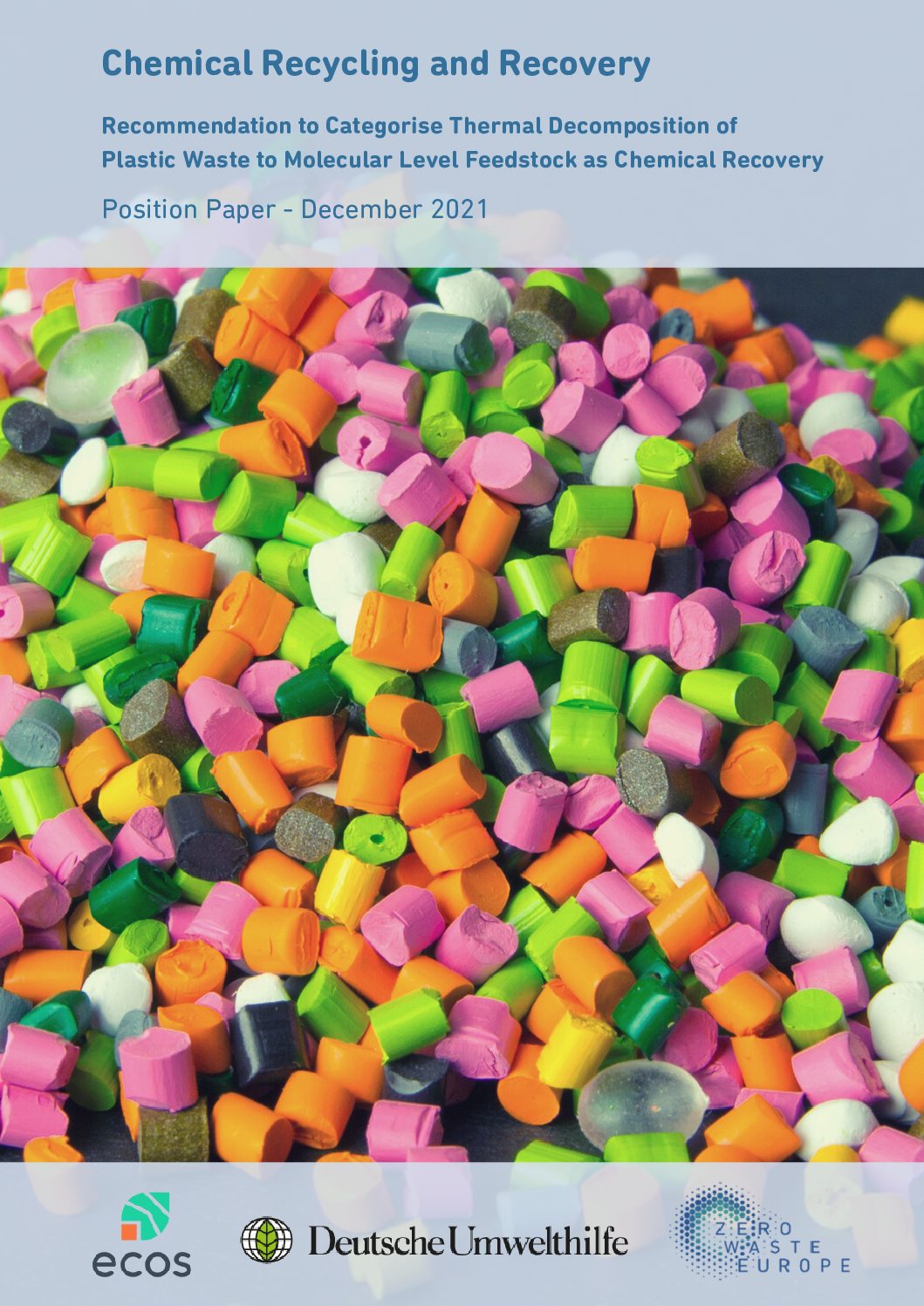
The objective of this briefing is to provide a recommendation for categorising thermal decomposition of plastic waste into feedstock molecules as chemical recovery. This covers mainly pyrolysis and gasification techniques.
The European waste hierarchy for a circular economy must be operationalised to favour reduction, reuse, and, as a last resort, recycling. It is, thus, essential to distinguish plastic waste recycling operations from recovery techniques. As such, pre-treatment of plastic waste into feedstock molecule shall be classified as chemical recovery and not chemical recycling.
Available in English.
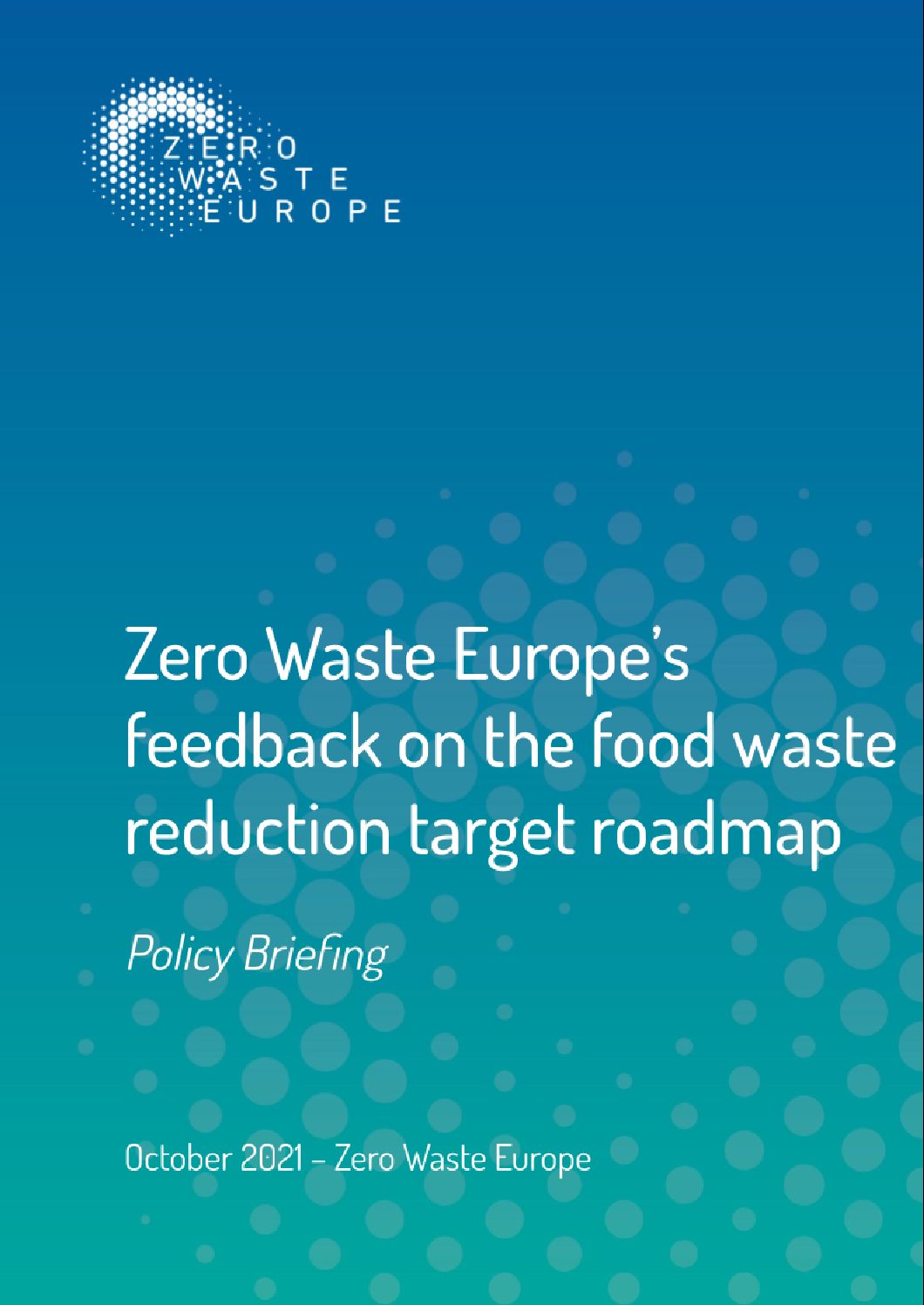
Zero Waste Europe welcomes the initiative of the European Commission to start the process to set-up binding food waste reduction targets across the EU. Food waste is a multifold problem that not only causes environmental and climate damage but is also morally unacceptable.
Therefore, it is essential to properly address this issue by adopting efficient and ambitious targets for the coming years.
Available in English.

To ensure the EU is having a neutral impact on climate change by 2050, the European Commission is currently reviewing all relevant EU policies, including the Emissions Trading System (ETS), and proposing extending the ETS to new sectors of the economy. This revision is a crucial opportunity to subject this carbon-intensive municipal waste incineration industry to the “polluter pays” principle by pricing in the carbon cost of burning waste to progressively reduce emissions from the sector.
Available in English
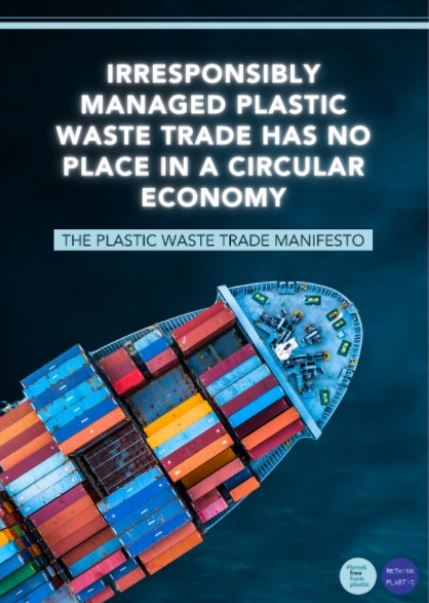
We cannot aim to achieve a truly safe circular economy with ambitious reductions in resource use, while we continue to offload the burden of our plastic waste elsewhere. This manifesto is a call to EU institutions to legislate, through the Waste Shipment Regulation, an end to plastic waste exports from the Union and intra-EU management of European plastic waste that is in line with a genuine circular economy.
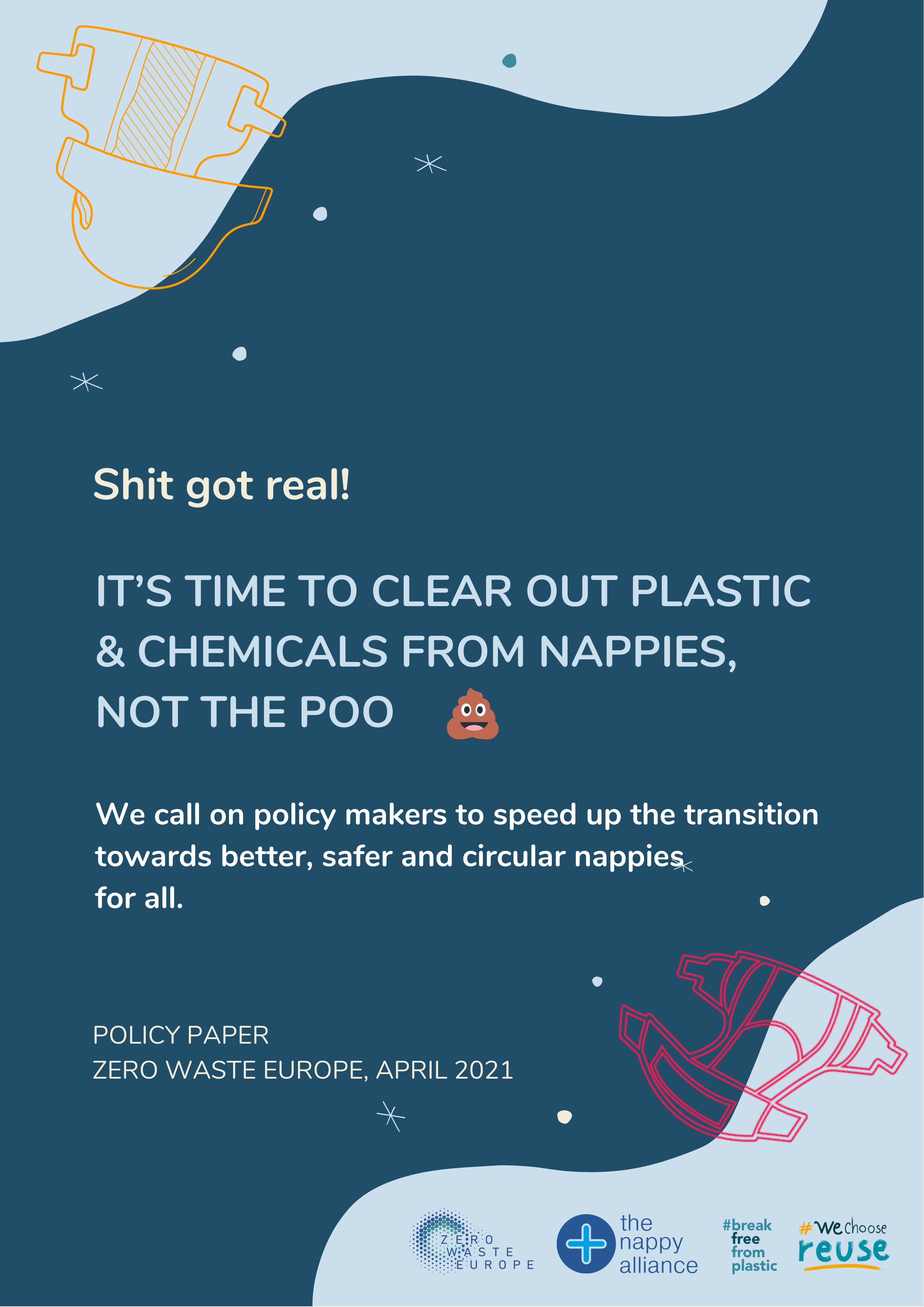
In the context of #ReusableNappyWeek 2021, we throw the spotlight on baby nappies by exposing the impacts related to the production and consumption of conventional single-use baby nappies; showcasing the reusable solutions and their benefits; and demanding policy change at the European, national and local level.
Available in English
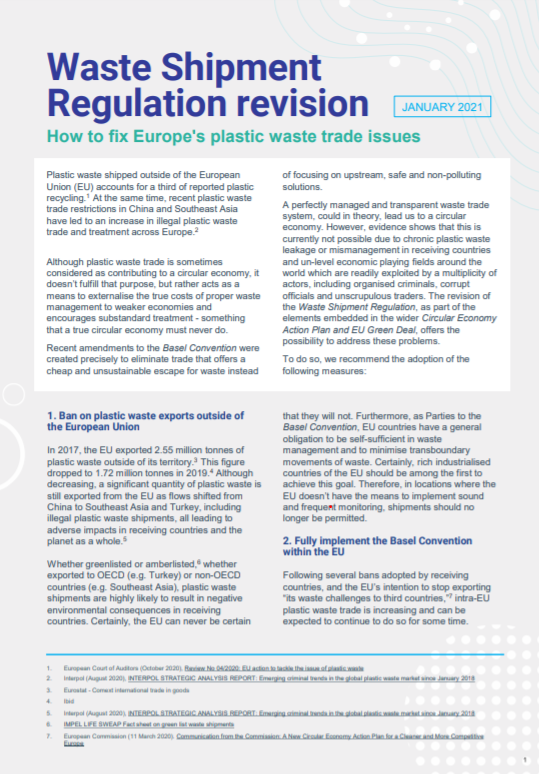
One third of reported plastic packaging recycling is actually shipped outside of the European Union! Exporting waste externalises the problem, placing the burden on other countries. The revision of the Waste Shipment Regulation offers an opportunity for change! Read our recommendations.
Available in English.

















